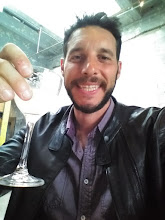Hinkley
Although it is winter, the final shimmers of the day’s heat are dancing up from the asphalt as the driver passes a sign: “Hinkley, California. Pop. 221.” The inside of the car has retained a fair bit of that heat as well. The driver begins to notice the faint stickiness of sweat mixed with dust collecting along the valley down the middle of his back. It clings through a cotton undershirt to the flannel of his jacket, which in turn smacks against the vinyl seat-back whenever he shifts forward.
A lit-up clock face at a passing gas station reads five past seven. Judging from the way the night has settled the shards of deep blue, sticking out of the horizon, into a more welcoming purple, that could be correct. Then again, the gas station looks as if it may not have serviced a car in years.
The driver lowers his window while wondering what seven o’clock out in the desert, in the dead of winter, exactly feels like. Indiscernible: that’s what he decides. Time stretches both ahead and behind, disappearing much like the highway; both gradually fading under the weight of their own infinite expanse.
The driver, on the other hand, is a finite being in his essence, and he doesn’t do well with concepts much larger than himself. So he settles for: “Plenny a time. Better sel’in tho. S’gonna be anotha long-ass night t’night.”

